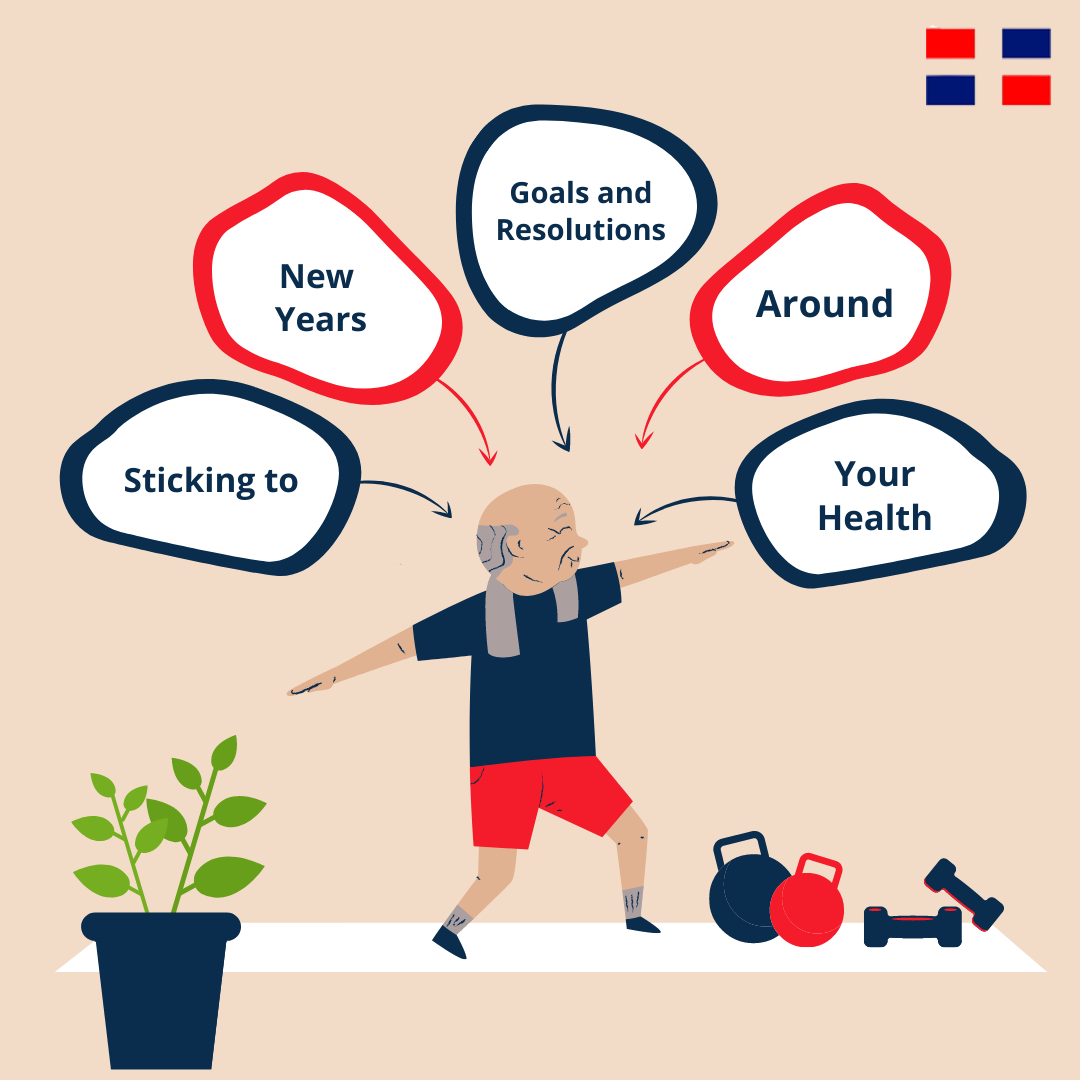It already seems a long time since the New Year. Did you make some resolutions on January 1st? How are you going with them?
Health-related goals feature heavily in New Year’s resolutions. Maybe you vowed to:
Lose weight
Join a gym or exercise more
Quit smoking
Cut back on the booze
Eat a healthier diet.
They’re all great goals. A person who successfully kept any one of those resolutions is likely to experience a substantial improvement in their health and reduce their risk of many serious health conditions including cancer, diabetes and cardiovascular disease.
If only it wasn’t so very hard to turn good intentions into genuine change!
Here are a few ways to give yourself an edge and help you stick to your resolutions.
1. One resolution will do
It’s tempting to overdo it with New Year’s resolutions. Somehow we get this inflated sense of confidence on New Years’ Eve and think that we’ll be able to lose weight, start exercising, learn how to play the guitar and be fluent in French by the end of January.
That’s not going to happen!
It’s better to throw your effort behind one resolution than divide it between many. So, what’s the most important thing for you to tackle right now?
Since many, many people resolve to lose weight, we’ll focus on that example for the rest of this blog. If your resolution is different, then apply the ideas below to your own situation.
2. Find your ‘why’
Ask yourself why you made this resolution. Why is losing weight important to you.
Your initial reasons might include things like:
Improving your appearance
Reducing your risk of future health problems
Improving current health conditions
Having more energy
Improving your self-confidence.
Those are all good reasons. But now dig a little deeper. You’ll find some stronger and more personal reasons buried here. They might include:
Being able to run around and play with your kids or grandkids rather than sit watching
Enjoying new adventures and experiences with your partner rather than staying home
Looking great at your daughter’s wedding
Living longer so you can enjoy your grandchildren.
Note how these are all things you’ll gain by losing weight. That’s helpful to remember when you feel like you’re missing out on other things because of your goals.
3. Set meaningful goals
Losing weight is a worthy goal but it’s too vague to help you much. Let’s create some meaningful goals. There are a couple of helpful techniques for this.
One is to create a series of smaller goals:
Long-term goal: lose 15 kg in the next 6 months
Short-term goal: break your long-term goal into a monthly goal, such as lose at least 2.5 kg every month
Process goals: these explain how you’ll do it, such as doing 30 minutes of swimming on Mondays, Wednesdays and Fridays or eating 5 servings of fruit and veggies every day.
Another strategy is to use the SMART criteria for goal setting.
An effective goal should be:
Specific: I want to lose 15 kg.
Measurable: Weigh in regularly and track your progress
Attainable: You probably can’t do an hour at the gym each day or never eat chocolate again. But you could exercise three times a week or reserve treat foods for the weekend.
Relevant: The goal has to be meaningful to you, something that will make a difference to your life.
Time-limited: A good goal needs an ultimate deadline (e.g. 6 months) and often a series of smaller deadlines to keep you on track.
4. Plan for challenges
Which situations are likely to threaten your success? If you eat when stressed, then what will you do instead next time you feel overwhelmed or anxious? Could you go for a walk, call a friend or have a bath?
If there’s a party coming up then how will you handle your food intake? Maybe you’ll only go to the buffet once rather than keep grazing, maybe you’ll eat less that day so you can have more that night or something else.
Making a plan helps you stay on track, continuing all the good new habits you’re forming.
5. Recover from setbacks
You will face setbacks – everyone does. It’s normal for motivation to fluctuate and sometimes you will still stuff your face with cheesecake instead of going to pilates.
When that happens, listen to your thoughts. They’ll probably start telling you that you’ve blown it, all your hard work is wasted, you’ll never succeed anyway and, heck, you might as well have the rest of the cheesecake with a big bowl of ice cream on the side.
None of that is true. They’re just thoughts and you don’t have to listen to them. It’s more helpful to accept you’ve had a setback, see if you can work out what triggered it and learn from the experience.
Then you recover. You go back to your plan and you carry on acting like someone who will succeed, even if you don’t really feel that yet. We tend to think motivation comes first and is followed by action but, quite often, motivation grows as we take our planned steps.
As good habits guru James Clear notes, ‘Motivation is often the result of action, not the cause of it. Getting started, even in very small ways, is a form of active inspiration that naturally produces momentum.’
6. Get support
You can’t do this alone. You’re more likely to succeed with the help of your:
Family and friends who cheer you on
GP to help you learn about losing weight, refer you to other professionals who can help, and take relevant before and after tests that will show you how your efforts are improving your blood sugar, cholesterol or blood pressure, for example
Support group – there are now many online or face-to-face ways to connect with other people who are losing weight and can help you keep going.
7. Track your progress and celebrate milestones
Tracking your progress could involve weighing regularly or ticking off each time you’ve exercised as planned.
Did you meet your weekly or monthly goal? Did you lose your first 5 kg or reach the half-way point towards your ultimate goal? Then congratulate yourself – but not with food. Perhaps you can buy a new, smaller outfit or enjoy a night out at the movies. Celebrating the achievement of smaller goals can boost your motivation to keep going.
How can we help?
If you’ve made a New Year’s resolution and would like some help to fulfil it, then please come and see a GP at Peregian Family Medical Centre.
GPs love it – absolutely love it – when patients come in with a renewed commitment to take care of themselves and improve their health. We’re certainly here for you when you’re sick but we’d much rather help you stay well.
Your GP is a great source of advice and support on many aspects of health improvement such as losing weight, reducing alcohol intake or quitting smoking. We can help you set meaningful goals, monitor your progress and show you that your efforts are indeed paying off with improved health outcomes such as lower blood pressure, better diabetes management, a smaller waistline and a lower cardiovascular risk profile.
If you’re not sure where to start, then consider a health assessment if you’re eligible.
Book an appointment today.
Disclaimer
All information is general in nature. Patients should consider their own personal circumstances and seek a second opinion.






